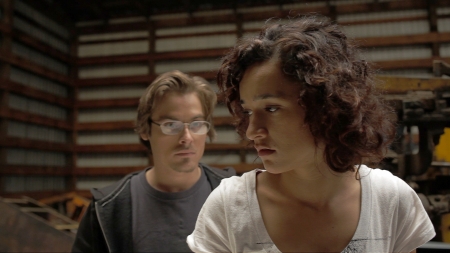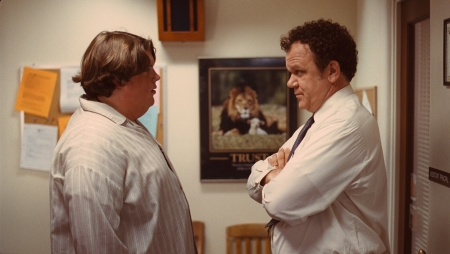

By Kim Voynar Voynar@moviecitynews.com
SIFF 2011: The Preview
 Thursday evening, the 37th edition of the Seattle International Film Festival will kick off with a Gala opening screening of The First Grader, followed by a sure-to-be-packed opening party. Justin Chadwick’s charming drama about an 84-year-old Kenyan freedom fighter who decides to take advantage of the government’s free education program by enrolling in his village’s school is an interesting choice for a festival opener: There are no big stars to parade down the red carpet — but then Seattle’s never really been the kind of festival locals flock to because of the stars. It’s a rather innocuous, crowd-pleasing choice, not likely to offend any festival donors — but then, rebellious Seattle isn’t exactly the kind of town where not offending is the first priority.
Thursday evening, the 37th edition of the Seattle International Film Festival will kick off with a Gala opening screening of The First Grader, followed by a sure-to-be-packed opening party. Justin Chadwick’s charming drama about an 84-year-old Kenyan freedom fighter who decides to take advantage of the government’s free education program by enrolling in his village’s school is an interesting choice for a festival opener: There are no big stars to parade down the red carpet — but then Seattle’s never really been the kind of festival locals flock to because of the stars. It’s a rather innocuous, crowd-pleasing choice, not likely to offend any festival donors — but then, rebellious Seattle isn’t exactly the kind of town where not offending is the first priority.
Personally, I would have loved to have seen SIFF talk Fox Searchlight into screening The Tree of Life as the Seattle opener, hot on the heels of its Cannes debut and a good week before the film’s NY release date of May 27 (and a month before it hits Seattle June 17). Give this town something deep and challenging to chew on as they sip their post-screening cocktails at the Opening Night Party. But, c’est la vie. The First Grader‘s a good enough film, it will please the crowd, drinks will be served and appetizers scarfed down, and all will be well.
Seattle’s fest proper lasts 25 days, but three weeks of press screenings, to which Full Series and higher passholders have access, mean it’s really a six week fest if you live here. Because of that, it’s the one fest I do actually treat as though it’s a marathon and not a sprint.
As an aside: We have a great cinephile crowd in this town, and the SIFF press screenings I’ve been to thus far have all been packed near-full with serious passholders. SIFF passholders are so passionate about films that many of them — known collectively as the “Fools Serious” in a clever bit of wordplay — try to outdo each other seeing the most films during the fest. They even have their own voting ballot. I love Seattle.
Anyhow, I generally approach SIFF with a dual focus: To catch up on anything out of Toronto or Sundance that I may have missed, and to catch some of the more obscure films that I’m less likely to get a chance to see later. Films that already have distribution are generally on the Hold Review list at this fest, even if they were already reviewed in abundance at their previous fests, so it makes sense, as much as possible, to spend my time catching those films that don’t have distribution yet, and that I can actually write about.
The fest catalog is a lot to navigate, so here, to help you out, are some of the films I’m most looking forward to catching over the next 25 days, broken down by category. And if you’re looking for recommendations of what to catch at the fest, I’ve included my picks from each category as well; these are films that either I’ve seen myself and recommend, or that I’ve heard enough about to convince me they’re worth checking out.
CONTEMPORARY WORLD CINEMA
This category almost always ends up encompassing the lion’s share of my SIFF choices in any given year, as it tends to be one of the strongest sections of the fest and is great for cutting a broad swath through the best in world cinema. Here are some of the films I’m hoping to check out from this category this year: All Your Dead Ones (Columbia), As If I Am Not There (Ireland), Black Bread (Spain), Burke & Hare (UK), Crying Out (Quebec), Everything Will Be Fine (Denmark), Fathers & Sons (Canada), Hooked (Russia), Killing Bono (UK), Lys (Germany), Microphone (Egypt), Nothing’s All Bad (Denmark), Nuummioq (Greenland), On Tour (France), Our Life (Italy), Outside the Law (Algeria), A Quiet Life (Italy), Shocking Blue (Netherlands), Spud (South Africa), A Thousand Fools (Spain), Toast (UK), Tomorrow Will Be Better (Poland), Win/Win (Netherlands), The Yellow Sea (South Korea), You Are Here (Canada).
PICKS: 3 (Germany), Submarine (UK), The Trip (UK), Circumstance (Iran), Silent Souls (Russia), and We Are the Night (Germany).
Of Special Interest: I can’t say I recommend Iwai Shunji’s Vampire, exactly, if by “recommend” we mean “think you might really enjoy this.” Vampire had some of the worst buzz I heard at Sundance, and I was one of I think five people who stuck out its press screening for all 119 occasionally excruciating minutes. However … while the score is overbearing and the film overall occasionally ponderous — it would benefit from losing a subplot and shaving maybe 20 minutes off — it’s also very beautiful in a weird way. The cinematography is frequently quite stunning, and there is, at least, ambition in its ideas and scope. Also, there’s an excellent performance by Keisha Castle-Hughes in the first 20 minutes or so. If those things sound intriguing to you, by all means check it out. But if you hate it, don’t blame me. I told you it was long and weird.

DOCUMENTARIES
SIFF is a great fest at which to catch up on docs that I missed at earlier fests, as they tend to have strong programming in this category. Here are the ones I’m most looking forward to seeing this year: 12 Angry Lebanese (Lebanon), Backyard (Iceland), Blinding (Canada), Grandma, A Thousand Times (UAE), Hit So Hard (USA), Holy Rollers: The True Story of Card Counting Christians, How to Die in Oregon (USA), Lesson Plan (USA), My So-Called Enemy (USA), The Redemption of General Butt Naked (USA), Revenge of the Electric Car (USA), Shut Up, Little Man! An Audio Misadventure (Australia), The Sound of Mumbai: A Musical (UK), and Steam of Life (Finland)
PICKS: Buck(USA), How to Die in Oregon (USA), Life in a Day (UK), Page One: Inside the New York Times (USA), Project Nim (USA), Red Eyes (Chile), Tabloid (USA)
Of Special Interest: The Interrupters (USA), the latest effort from Steve James (Hoop Dreams), is the best doc I’ve seen so far this year. I’ll warn you going in: It’s long. Like, 144 minutes long. But it’s really, really good, and completely worth every minute. I like it so much, I’ll probably go see it again, just because.
NEW AMERICAN CINEMA
The “latest and greatest” of American indie film; 17 films, 10 of which are competing for the FIPRESCI prize. Look here for up-and-coming voices. Notable entries:
Another Earth — Notable for making a splash with its Sundance debut. Co-writer Brit Marling was bandied about as one of the “It Girls” of this year’s Sundance.
Bellflower — The film I most regret not being able to catch at Sundance this year. People couldn’t seem to stop talking about this film. Probably the film from this category I most want to see.
Codependent Lesbian Space Alien Seeks Same — You know you want to see this one just because of the title.
The Darkest Matter — A brainy sci-fi film created in collaboration between a 25-member teen crew and adult mentors? Worth checking out just because of that.
Gun Hill Road — Another of the hot buzz films of Sundance that I missed catching there. Okay, this is another Sundance film in this category that I really want to see.
Jess + Moss — Er, ditto.
Littlerock — Earned director Mike Ott the Acura Someone to Watch Award at this year’s Spirit Awards. So go watch it.
Natural Selection — Won both the Grand Jury Prize and the Audience Award at this year’s SXSW Film Festival.
Of Special Interest: I highly recommend Terri, Azazel Jacobs’ touching and honest portrait of an outcast teenager (Jacob Wysocki) and his high school vice principal (John C. Reilly). If you haven’t seen this film yet, SIFF is a great time to catch it.
NORTHWEST CONNECTIONS
Yes, yes. Very often, these “regional” categories at festivals can be the place to which programmers relegate those films they feel obliged to include in their fest because of their connection to the area, even if they suck. Fortunately, for those of us who live in Seattle and get to go to all 25 days of SIFF, the Pacific Northwest happens to be a bit of a mecca for independent filmmaking. Which means that the likelihood of seeing something awesome (or at least worth seeing) in this category is pretty darn good.
Picks: I’ve seen many of the films in this category, so probably won’t flesh out my own schedule much here. Those I’d particularly recommend include: The Catechism Cataclysm (very trippy and weird), How to Die in Oregon (excellent doc, winner of the docs Grand Jury prize at Sundance), The Off Hours (Megan Griffith’s excellent debut), and Surrogate Valentine (nice black-and-white, old guy-new guy, buddy-road-trip flick about a musician saddled with an actor studying to play him in an independent film).
Of Special Interest: If you can only see ONE film at SIFF, and you want to see the film you absolutely should not miss, make your pick Mark Jackson’s Without. It got two awards mentions at its Slamdance debut for the film overall and for the lead performance, and won the narratives jury award at Sarasota (disclosure: I served on that jury). This smartly directed, tense drama features a take-notice performance by Joslyn Jensen. People, you don’t want to miss this one.

MIDNIGHT ADRENALINE
Pretty much exactly what it sounds like. My favorites from this category last year were Robogeisha and Tucker and Dale Vs Evil. This year, I’m looking forward to indulging my occasional taste for potentially cheesy midnight fare with The Intruder (Thailand), Karate-Robo Zaborgar (Japan), The Last Circus (Spain), and TrollHunter (Norway).

















